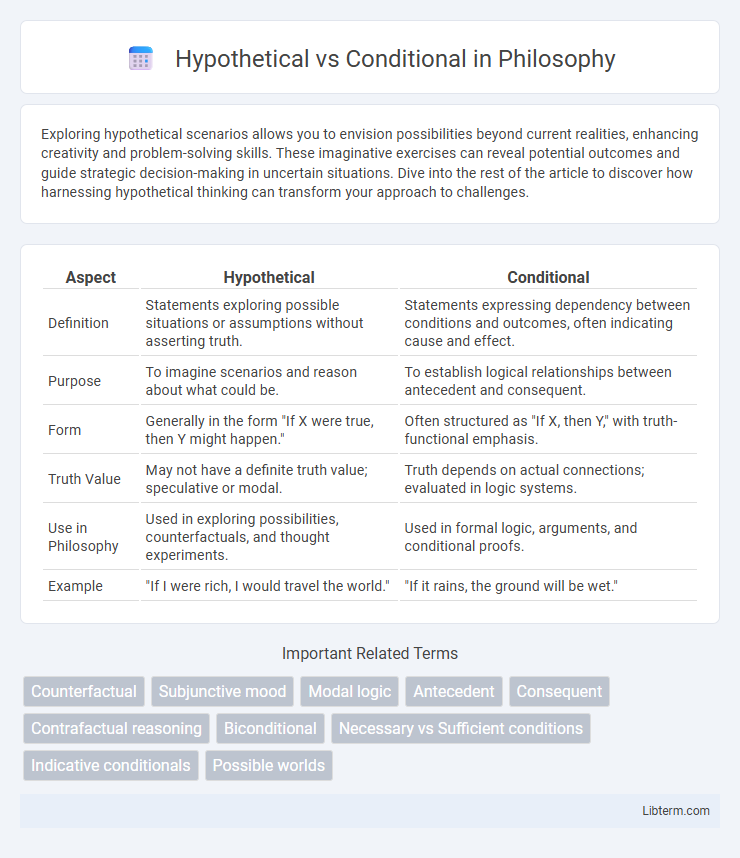Exploring hypothetical scenarios allows you to envision possibilities beyond current realities, enhancing creativity and problem-solving skills. These imaginative exercises can reveal potential outcomes and guide strategic decision-making in uncertain situations. Dive into the rest of the article to discover how harnessing hypothetical thinking can transform your approach to challenges.
Table of Comparison
| Aspect | Hypothetical | Conditional |
|---|---|---|
| Definition | Statements exploring possible situations or assumptions without asserting truth. | Statements expressing dependency between conditions and outcomes, often indicating cause and effect. |
| Purpose | To imagine scenarios and reason about what could be. | To establish logical relationships between antecedent and consequent. |
| Form | Generally in the form "If X were true, then Y might happen." | Often structured as "If X, then Y," with truth-functional emphasis. |
| Truth Value | May not have a definite truth value; speculative or modal. | Truth depends on actual connections; evaluated in logic systems. |
| Use in Philosophy | Used in exploring possibilities, counterfactuals, and thought experiments. | Used in formal logic, arguments, and conditional proofs. |
| Example | "If I were rich, I would travel the world." | "If it rains, the ground will be wet." |
Understanding Hypothetical and Conditional Statements
Hypothetical and conditional statements both express relationships between events or conditions, but differ in certainty and structure. Conditional statements typically follow "if-then" logic, indicating that one event depends on another occurring. Hypothetical statements explore imagined scenarios or possibilities without asserting actual outcomes, often using modal verbs like "would" or "could.
Key Definitions: Hypothetical vs Conditional
Hypothetical statements describe situations imagined or contrary to fact, often expressed using "if" to speculate on outcomes that are not real or certain. Conditional statements present real or possible situations with logical cause-and-effect relationships, typically structured with an "if-then" format indicating specific conditions and results. Understanding the distinction is crucial for accurate use in logic, linguistics, and programming contexts.
The Structure of Hypothetical Statements
Hypothetical statements typically follow the structure "If + past simple, would + base verb," used to discuss unreal or imagined situations. Conditional statements often use "If + present simple, will + base verb" to express real or possible outcomes linked to specific conditions. Understanding these structural differences is crucial for analyzing and constructing accurate conditional or hypothetical clauses in English grammar.
Overview of Conditional Sentences
Conditional sentences express situations and their possible outcomes, often structured with "if" clauses. They are categorized into zero, first, second, third, and mixed conditionals, each indicating varying degrees of reality or time. Zero conditionals state general truths, first conditionals describe real future possibilities, second conditionals explore improbable or hypothetical present scenarios, and third conditionals deal with past situations that did not happen.
Main Differences Between Hypothetical and Conditional
Hypothetical statements express situations that are imagined or unreal, often using the past subjunctive or modal verbs like "would" to indicate outcomes that are not guaranteed. Conditional statements describe cause-and-effect relationships with real or possible scenarios, structured typically with "if" clauses and verb tenses matching the likelihood of the condition being met. The main difference lies in hypothetical sentences presenting speculative or contrary-to-fact conditions, while conditionals deal with actual or potential circumstances and their logical results.
Common Usage in English Grammar
Hypothetical sentences often describe unreal or imagined situations typically using past tense forms to express wishes or regrets, such as "If I were rich, I would travel the world." Conditional sentences, in contrast, state real or possible outcomes depending on certain conditions, often structured with "if" plus the present tense for general truths ("If it rains, the ground gets wet") or future scenarios ("If you study, you will pass"). Understanding the distinction improves clarity in expressing cause-effect relationships and speculative ideas in English grammar.
Examples of Hypothetical Statements
Hypothetical statements often involve imagining situations contrary to reality, such as "If I were a bird, I would fly across the ocean," illustrating a scenario that doesn't actually exist. These statements use the subjunctive mood to discuss possibilities detached from current facts, for example, "If she had studied harder, she might have passed the exam," emphasizing unreal past conditions. Such examples underscore the speculative nature of hypothetical statements in contrast to factual or real conditional sentences.
Examples of Conditional Sentences
Conditional sentences often follow specific patterns such as zero, first, second, and third conditionals, each illustrating different levels of possibility or time frames. For example, a first conditional sentence like "If it rains, we will cancel the picnic" refers to a real possibility in the future, whereas a second conditional sentence such as "If I were rich, I would travel the world" presents a hypothetical situation contrary to present reality. Third conditional sentences, like "If she had studied harder, she would have passed the exam," describe hypothetical scenarios in the past that did not happen.
Practical Applications in Writing and Speech
Hypothetical and conditional statements differ in their practical use; hypothetical statements explore imagined scenarios without assuming real-world accuracy, often used for creative writing and brainstorming. Conditional statements establish cause-and-effect relationships or prerequisites, critical for clear instructions, academic writing, and formal arguments. Mastery of both enhances clarity and precision in communication across various contexts like storytelling, technical documentation, and persuasive speech.
Tips for Distinguishing Hypothetical and Conditional
Hypothetical statements explore imagined or unreal situations, often using the past subjunctive or "would" to indicate outcomes not grounded in current reality. Conditional statements base their clauses on real or possible events, typically structured with "if" followed by a present or future tense verb to express cause and effect. To distinguish them, observe verb moods and tenses: hypotheticals use subjunctive forms to suggest improbability, while conditionals use indicative moods for scenarios that are plausible or factual.
Hypothetical Infographic

 libterm.com
libterm.com